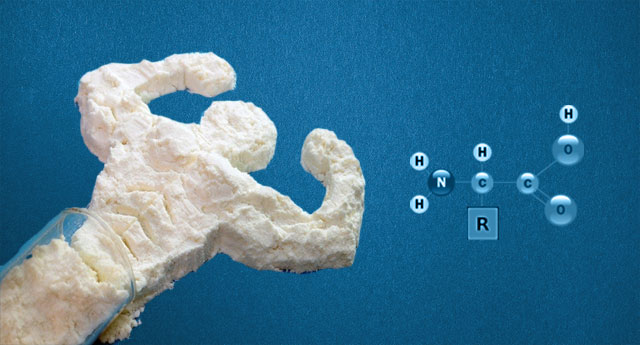Amino acids are very important as they offer therapeutic benefits to your body. A large proportion of our cells, muscles and tissue is made up of amino acids.

Amino acids are very important as they offer therapeutic benefits to your body. A large proportion of our cells, muscles and tissue is made up of amino acids, meaning they carry out many important bodily functions, such as giving cells their structure. They also play a key role in the transport and the storage of nutrients. Amino acids have an influence on the function of organs, glands, tendons and arteries. They are furthermore essential for healing wounds and repairing tissue, especially in the muscles, bones, skin and hair as well as for the removal of all kinds of waste deposits produced in connection with the metabolism.
| S.No | Amino Acid | Functions in Body |
|---|---|---|
| 1. | l- histidine | Increase muscle mass and help muscles recover after exercise. |
| 2. | l-isoleucine | Production of carnitine, a nutrient responsible for converting fatty acids into energy and helping lower cholesterol. |
| 3. | l-leucine | Building of various protein molecules. |
| 4. | l-lysin | Building protein and includes the element sulphur. |
| 5. | l-methionine | Supports cardiovascular, liver, central nervous, and immune system function. |
| 6. | l-cysteine | Use to prevent depression, Parkinson's disease, chronic pain, osteoarthritis. |
| 7. | l-threonine | Production of several important brain chemicals called neurotransmitters. |
| 8. | l-phenylalanine | Dietary supplement to combat mental illnesses, |
| 9. | l-tyrosine | Prevention of leukopenia, hypoalbuminemia, hair loss, and weight loss. |
| 10. | l-tryptophan | Prevents sleep disorders, depression, anxiety, migraine and tension. |
| 11. | l-valine | Keeping a balanced acid-base ratio. Important for firm and supple skin. |
| 12. | 5-hydroxy tryptophan | Reduce side effects of cancerchemotherapy including diarrhea, pain and swelling inside the mouth (mucositis), nerve pain. |
| 13. | l-glutamic acid | Major component of the protein collagen and plays a key role in the stability of the collagen triple helix needed for healthy joints. |
| 14. | l-glutamine | It is used for chest pain and for eye infection. |
| 15. | l-hydroxyproline | Precursor of citrulline, proline and glutamic acid. |
| 16. | N-acetyl cysteine | Role in combating arteriosclerosis, or hardening of the arteries. |
| 17. | Ornithine | Plays an important role in the catalytic function of many enzymes. |
| 18. | l-proline | Alleviating stress, stimulating your mind and improve neural communication. |
| 19. | l-serine | Make nervous system healthy. |
| 20. | l- acetyl Tyrosine | Memory enhancer. |
| 21. | l-3.4-Dihydroxy phenylalanine | Used as catalyst for metabolic reaction. |
| 22. | l-hydroxy lysine | Precursor of other amino acids. |
You may have heard the term before, but what exactly are micronutrients? Technically speaking, micronutrients are various types of chemicals that are found in trace amounts in the foods we eat. Most people recognize “micronutrients” by common names like vitamins, minerals and antioxidants.
Micronutrients are essential because they protect our bodies from disease, slow the aging process and help every system in our bodies properly function.
The body uses dozens of different beneficial micronutrient chemicals every single hour of every single day to keep us energized, produce enzymes and hormones, and prevent deficiencies. Specific micronutrient deficiencies (such as a vitamin D, iodine or iron) can result in various problems like mental impairment, poor digestion, thyroid problems and bone loss.
Among other roles, the job of micronutrients includes:
Every living organism needs micronutrients for normal growth, development and energy production — and humans are no exception. Because we’re very complex creatures and have brain capacity beyond other animals, we need even higher levels of many micronutrients and antioxidants compared to many other species in order to fuel digestion, mental performance, physical activity and so on
In fact, humans need more than 50 different micronutrients for optimum health! Every system within the body depends on combinations of various micronutrients — the digestive system, reproductive system, nervous system, immune system and so on.
What are micronutrients found in? Whole foods of all kinds — meaning those that are found in nature and not processed — are the best sources of micronutrients, including antioxidants (also called phytonutrients), vitamins and trace minerals. These nutrient-dense foods include vegetables, fruit, nuts, seeds, ancient grains, legumes and quality animal products.